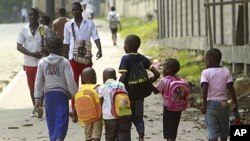As the African Cup of Nations kicks off in Equatorial Guinea, January 21. Human Rights activists are sharply criticising the country for pouring millions into the football, soccer, tournament amid widespread poverty. With poor press freedoms and one of the worst human rights' records in the world, some are asking can Equatorial Guinea justify putting on a show for the world's media?
With the 28th African Cup of Nations in Equatorial Guinea, human rights campaigners, event organizers and media people are asking if this repressive nation is capable of dealing with the arrival of hundreds of foreign journalists.
Sports reporters from around the world arrived this week in the capital Malabo and match venue, Bata, to cover the three-week football, soccer, event, co-hosted by Equatorial Guinea and neighboring Gabon.
Equatorial Guinea President Teodoro Obiang, who has been in power for 33 years, says he views the games as an opportunity to sell the country’s image.
But repression has been a hallmark of Obiang’s rule - with political opponents and the press routinely subject to harassment. Human Rights Watch says torture also remains a serious problem.
Lisa Misol of Human Rights Watch believes Mr. Obiang simply wants photo-op images to showcase the country in a positive light - but doesn’t want the truth to come out about poverty levels.
“The government of Equatorial Guinea and President Obiang himself seem to be convinced that, because they have thrown so much money to build such impressive monuments and buildings, that if they invite foreigners to come see them they will get good coverage. And yet they are very nervous with any journalists who show interest in telling the story of the poverty that still exists in the country - so that’s when they react very strongly,” Misol said.
The Obiang government has undertaken a massive building spree in preparation for the sports event, financed by oil revenues. New buildings include a $77 million presidential guesthouse and an $830 million conference center, resort and artificial beach.
Much of the construction is for the enjoyment of the country’s tiny elite and foreign guests - but the lavish spending offers little apparent benefit to the majority of the population.
Statistics about poverty levels in Equatorial Guinea are notoriously scant, as the government does not update records. But World Bank figures put three quarters of the population below the poverty line. Misol says the statistic is surprising.
“That’s astounding in a country that has some of the highest wealth per capita on the planet. It’s a very tiny country with a small population and enormous oil revenues,” noted Misol.
Journalists who have tried to report in the country on political and development issues before now have been arrested, made to delete footage and deported.
Philipe Nanga is a Human Rights Activist in the region. He says the African Cup of Nations is an opportunity to highlight the problems in Equatorial Guinea.
The situation is serious, he says. It is a country where people are beaten up, pushed around and hunted like dogs. He says, it is a country where foreigners are refused; you cannot work there.
Human Rights Watch says it is not calling for a boycott of the games. But instead it wants journalists to see behind the story and try to cover the less air-brushed side to Equatorial Guinea.
“To the contrary, it’s useful for people to go to the country. We are just trying to encourage everyone who attends - including sports journalists - to open their eyes to what’s behind the new stadiums and the monuments and the presidential palaces and look for the poverty that is extensive in the country and report on what is really going on there," Misol added. "As a chance to shed a light on the terrible contradictions of life in Equatorial Guinea.”
The Africa Cup of Nations competition continues until February 12.
Equatorial Guinea to Host African Cup Amid Widespread Poverty
- By Jane Labous




